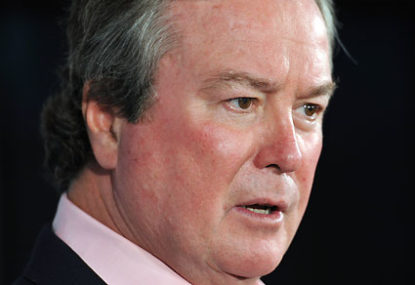Below is the text of a letter I have sent to both John O’Neill, CEO of the ARU, and the IRB Laws and Regulations group.
It may sound like a cry in the wilderness, but this was prompted by a long-standing dissatisfaction I have had with the outcome of matches unduly influenced by penalties:
Dear Mr. John O’Neill
I read with interests the comments of British and Irish Lions manager Andy Irvine in today’s Sydney Morning Herald and have taken this opportunity to address my comments to you.
Irvine notes that too many matches are decided by penalties, penalties often awarded on 50-50 calls.
Countless games are won by teams that score fewer tries than their losing opponents.
The Wallabies results this season are a clear indication of the issue:
• The match against Scotland was a try-less draw won by Scotland on a higher penalty-conversion rate.
• The first Wales test was won by the Wallabies three tries to one, but the Welsh stayed in touch through penalties.
• The second test was won by Wales two tries to one, but was awarded to Australia through conversion of penalties.
As noted by Irvine this distortion affects the way teams play, particularly northern-hemisphere teams.
He makes the point that many penalties are 50:50 calls on technical interpretations.
What is a legal action at one moment becomes a penalty offence a moment later.
An example is David Pocock legally playing the ball when on his feet but a penalty being awarded when an opposing player pulls him forward.
The referee decides that at some point he is off his feet but still playing the ball.
Another point I would like to make is that many infringements that attract a penalty arise from the offender being outplayed or having a technical deficiency exposed, particularly in the scrum.
The penalty awarded against Australia at the end of the Scotland match, which won them the game, is a good example.
Penalties are not awarded for a failure in skills for the knock-on or forward pass.
It makes no sense for a front rower who is outplayed by his opposite number to be penalised to the extent of giving away points as a direct consequence.
Offside calls are another source of penalties that are by definition borderline, as are many others.
Leaving aside the difficulties in making those 50:50 calls and infringements that are clearly dangerous or foul play, it is worth considering why players infringe.
They do it to slow down, deny or steal possession from the opposition.
Taking things too far should not gift the opposition points. A simple solution is to address the intention of the infringement.
That is, to return possession to the team infringed against.
When a referee detects an infringement the penalty should be awarded as normal but a shot at goal should not be allowed.
The team awarded the penalty can decide how to utilise the penalty.
That could be through a kick to the sideline, retaining the throw to the lineout, feeding a scrum, taking a tap, passing it back for a field goal or whatever available action they feel suits their strengths or field position.
In this way teams will need to score tries to win games and will also be penalised for infringements.
There may be a need to consider alternative sanctions for repeated offences within five metres of the try line.
Otherwise the change could be made immediately, without any significant change.
I trust these comments of use and that action is taken by the IRB.
Your sincerely,
A Concerned Rugby Follower
I have been fortunate enough to be able to discuss this with Spiro Zavos by email. He made the point that the ELVs addressed this issue in a large part, but were rejected by the European unions.
There is little chance we will see them get up in the short term.
He also made the point that penalties are needed to discourage negative and spoiling tactics. I agree with the last point and am happy for penalties to continue to be awarded.
Removing the shot at goal as an option will still punish teams that infringe by handing the ball back to the opposition, with an additional disincentive of also losing field position.
The referees will still have the sanctions of advancing the mark 10 metres, yellow cards and penalty tries.
It is not right that a team should lose by three points because one of them was too eager to come off the line in defence, or for numerous other “technical” offences.
Sure, award the penalty, but just take out the shot at goal as an option.
The ELVs got the kibosh from the British unions on the grounds that they were an attempt to speed up the game in Australia to help the ARU take on league.
Perhaps taking out the shot at goal from penalties, which doesn’t speed up the game appreciably, will open the door to moderating the offences that draw a penalty.
The players don’t have to play any differently and the referees don’t have to referee any differently.
All that is needed is the elimination of the shot at goal and the subsequent restart.
I’d love to see an exhibition game played this way.
It’s worth a try (no pun intended).





























































































